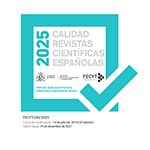Nuevos diccionarios para viejos problemas: abordando el tratamiento del léxico en el aula mediante el uso de herramientas innovadoras
Resumen
El modo en el que debe abordarse el tratamiento de la norma y la gramática en el aula es un debate ya clásico en la enseñanza de lenguas. Utilizar el léxico como elemento articulador para entender el sistema de la lengua, y servirnos del diccionario como recurso y herramienta fundamental en el aula constituyen un curso de acción que puede contribuir de manera relevante a dicho debate. La propuesta que planteamos consiste en la elaboración colectiva de un diccionario de neologismos, con las palabras utilizadas más frecuentemente por el estudiantado universitario, empleando el entorno virtual de Moodle. Es una propuesta pedagógica que se dirige al alumnado de primer curso del Grado de Maestro/a en Educación Primaria y que tiene como eje el diccionario, no solo como herramienta de trabajo, sino como meta final de la actividad de los estudiantes, que deberán decidir el lemario, crear sus propias entradas de forma rigurosa, documentada y sistemática, mediante el trabajo colectivo y la coevaluación en el grupo y usando diversas herramientas digitales.
Descargas
Descarga artículo
Licencia
La revista Didáctica. Lengua y Literatura, para fomentar el intercambio global del conocimiento, facilita el acceso sin restricciones a sus contenidos desde el momento de su publicación en la presente edición electrónica, y por eso es una revista de acceso abierto. Los originales publicados en esta revista son propiedad de la Universidad Complutense de Madrid y es obligatorio citar su procedencia en cualquier reproducción total o parcial. Todos los contenidos se distribuyen bajo una licencia de uso y distribución Creative Commons Reconocimiento 4.0 (CC BY 4.0). Esta circunstancia ha de hacerse constar expresamente de esta forma cuando sea necesario. Puede consultar la versión informativa y el texto legal de la licencia.










